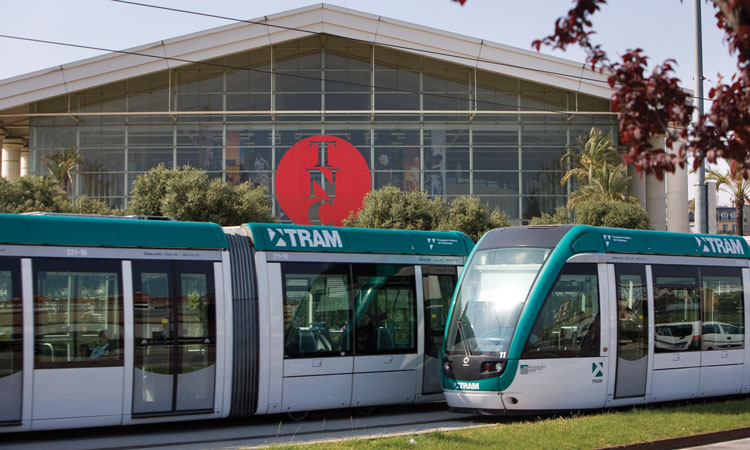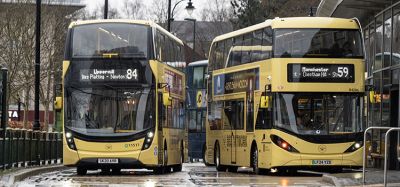Barcelona’s ‘T-Mobilitat’: a new ticketing system is almost here
- Like
- Digg
- Del
- Tumblr
- VKontakte
- Buffer
- Love This
- Odnoklassniki
- Meneame
- Blogger
- Amazon
- Yahoo Mail
- Gmail
- AOL
- Newsvine
- HackerNews
- Evernote
- MySpace
- Mail.ru
- Viadeo
- Line
- Comments
- Yummly
- SMS
- Viber
- Telegram
- Subscribe
- Skype
- Facebook Messenger
- Kakao
- LiveJournal
- Yammer
- Edgar
- Fintel
- Mix
- Instapaper
- Copy Link
Posted: 15 June 2014 | Josep-Anton Grau | No comments yet
The Barcelona metropolitan area is poised to make a quantum leap in urban mobility, which will subsequently be rolled-out to the rest of Catalonia, explains Josep-Anton Grau, Director General of the Barcelona Metropolitan Transport Authority (MTA). The project has been provisionally christened ‘T-Mobilitat’. The ‘T’ is the prefix borne by all our current public transport tickets, which take the form of cards – ‘targetes’ in Catalan – hence the initial. ‘Mobilitat’ is also used because users will no longer have a ticket entitling them to 10 trips (the popular T-10) in their pocket, or the quarterly ticket aimed at young people (the subsidised T-Jove), to give just two examples. Instead, they will have a real passport to the entire country, using just one ticket, which gives them access to the Barcelona metro system, and raises toll barriers on motorways. Essentially, an entire country’s mobility will be on a small chip.


The T-Mobilitat project is taking place at a time when the integrated fare system is coming to maturity, after the introduction of the ‘six rings’ system in the Barcelona area in 2001. This region contains 253 municipalities and is home to over 5.6 million people. At the urban centre is the city of Barcelona, the capital of Catalonia, which has an area of approximately 100km2 and a stable population of a million and a half inhabitants.
The main urban transport operator is Transports Metropolitans de Barcelona (TMB) which runs the city’s metro and bus lines. Other transportation companies include the rail services provided by Ferrocarrils de la Generalitat de Catalunya (FGC), the Rodalies de Catalunya regional train network (operated by RENFE), and the recently established tram system (TRAM), which was created a decade ago at each end of Barcelona’s Avenida Diagonal to provide links to the metropolitan area. All these services, which are complemented by the buses of the metropolitan and inter-urban networks and those of other municipalities, make up a large and dynamic network which, in a sense, is a model for many similar cities and is subject to a demand that exceeds 900 million journeys every year and has high levels of satisfaction among users, according to regular surveys.
Economic crisis
In recent years, the economic crisis and our commitment to public service have led us to expand our social measures with the launch of subsidised tickets (for children, young people and large families, among others). These have occupied a growing market share and accounted for 22% of the total in 2013. However, the current system has some limitations: its magnetic stripe technology (which was implemented for the 1992 Barcelona Olympic Games) is now obsolete. The Barcelona Metropolitan Transport Authority (MTA) has decided to take advantage of the need to change the sale and validation systems to launch a new fare and management system, and to create a new paradigm for urban and interurban mobility.
Managing change
We have also had to manage this change in an adverse economic climate, marked by reduced demand, which is currently recovering, while maintaining our supply in line with our commitment to public service and consequently with the appearance of a financial imbalance. The owner institutions of the service – Barcelona City Council, the Barcelona Metropolitan Area and the Government of Catalonia – recently reached an agreement based on a programme for financial restructuring and viability in order to make the public transport system sustainable.
A logical consequence
Catalonia’s new transport pass is the logical consequence of the development of the integrated public transport system that was launched in 2001, which allows users to make journeys involving transfers with no financial penalty. This system’s maturity, together with technological development, the emergence of the web 2.0 and the spread of mobile communication among users, have almost naturally led to the concept of the T-Mobilitat. A single smart ticket, adapted to each individual’s use. In essence, the new model incorporates the demands of the socio-economic context in which it was created, meaning that the T-Mobilitat is a system that is unarguably sensitive to social needs. In addition to the groups that already benefit from subsidies (children, young people, seniors, members of single-parent families, unemployed people and members of large families) the new smart ticket will make it possible for schools, companies, institutions, tourist groups and other groups to negotiate advantages.
Fostering loyalty among the clients of public transport
With the new T-Mobilitat project, the MTA also reinforces its strategy of fostering loyalty among the clients of public transport, which is a goal that we have been pursuing year after year, using the only tool we have had at our disposal so far – the fare policy. The commitment in the latest fare review to promoting tickets among the most frequent user groups and freezing the prices of the T-Mes and T-Trimestre tickets, among others, led to an increase in sales of these tickets in the first quarter of 2014 of almost 14% compared to the same period in 2013.
The T-Mobilitat is also the result of a clear nationwide commitment: it is built on the foundations of integration experienced in the Barcelona area, to spread the entire system of integration across Catalonia. At the same time, it introduces and develops the concept of mobility beyond public transport and considers its users – 75% of Catalonia’s population – as clients of the transport services in the broadest sense, meaning that the card will act as an all-in-one ticket for access to any transport-related product.
The maturity of technology
This has only been possible due to the maturity of the technology used to develop the new system, designed and promoted by the MTA with the close collaboration and commitment of Catalonia’s public transport operators. That is why it is possible to say that the T-Mobilitat has been made ‘by’ and ‘for’ the Catalan public transport system, following the model established by the European Commission in 2010, in Directive 2010/40/EU on Intelligent Transport Systems (ITS).
The transport ticket will be based on a high performance chip, applicable to any medium: in principle, a card, which may be plastic, for registered users, or cardboard for occasional users. However, in the near future it will be possible to integrate the T-Mobilitat in NFC mobile phones and many other media that will be developed, adapting them to the needs of a specific group, such as bracelets for children, or to marketing activities – limited edition key rings or souvenir cards based on a specific event, such as a sports championship.
The team behind the T-Mobilitat has created a high security system that guarantees the transactions carried out from end-to-end and makes it a genuine anti-fraud system, so that tickets can be blocked selectively if their misuse is discovered. This feature also makes the new ticket especially attractive for users, who at present have no way of recovering their investment if any of their tickets are lost or stolen. The new system allows misplaced tickets to be blocked and their entire balance to be transferred. All these new developments have led us to believe that with the new paradigm, we are moving from providing a range of transport tickets to launching an attractive transport application, which can be implemented in a variety of media, can be customised and is multi-directional. It is based on the contactless technology that has already been successfully used in other public transport systems all over the world.
Transparency and accessibility
The decision to personalise the new Catalan transport card means that we have to make an effort towards transparency and accessibility, which will take the form of the new Customer Service Centre. This new body will deal with problems and pass on the information provided by the system to users, using another newly created structure: the transport information management centre. For the first time, the MTA will have immediate access in real-time to all the relevant data on the state of public transport and mobility network integrated in the T-Mobilitat system. This is perhaps the real revolution in the new system. On one hand, this centralisation of information will provide a constant improvement in customer service by means of personalised messages, such as to regular users of a line that is experiencing problems at a given point in time. And on the other hand, the selective exploitation of these data will become essential for modifying frequencies or changing the routes of lines, for example. The management will have a new objective medium for planning, will be able to monitor journeys in real-time, and will have a powerful anti-fraud tool. The generation and systematisation of data from the T-Mobilitat will have a positive impact on the management of public transport networks in Catalonia and the user’s experience. The new system adapts Catalan public transport to modern users, who are hyper-connected and demand information, and extends the scope of mobility as a whole.
The implementation of the T-Mobilitat involves the entry into force of a new fare system that will automatically adjust the prices for trips to each user’s profile. As users make more journeys by public transport, the price of each validation will decrease, and reach zero for the most regular customers. Innovation has also reached our marketing channels: new ways of charging the ticket via the internet and mobile phones will be possible, as well as a post-paid direct debit for the service.
The new mobility paradigm in Catalonia is currently engaged in the tender process, and the pilot phase will begin in mid-2015. The launch of the ticket will begin in 2016, and it will coexist with the current magnetic system until 2017. At that point, the T-Mobilitat will take over as the main system for access to transport services in Catalonia, and become the first international benchmark for the comprehensive management of transport services.
The T‑Mobilitat is almost here.
Biography
Josep-Anton Grau is Director General of the Barcelona Metropolitan Transport Authority (MTA). He holds a degree in Architecture and Township Planning from the Polytechnic University of Catalonia, and postgraduate qualifications in Management and Public Administration (ESADE) and Senior Management (IESE). Josep-Anton was previously the Government of Catalonia’s Deputy Minister for Territorial Policy and Public Works and Deputy Minister for Transport. He was also the government’s representative to the Motorway Concessions Companies and the Director of the MTA between 1997 and 2002.
Related topics
Intelligent Transport Systems (ITS), Ticketing & Payments
Issue
Issue 3 2014
Related modes
Metro
Related cities
Barcelona








